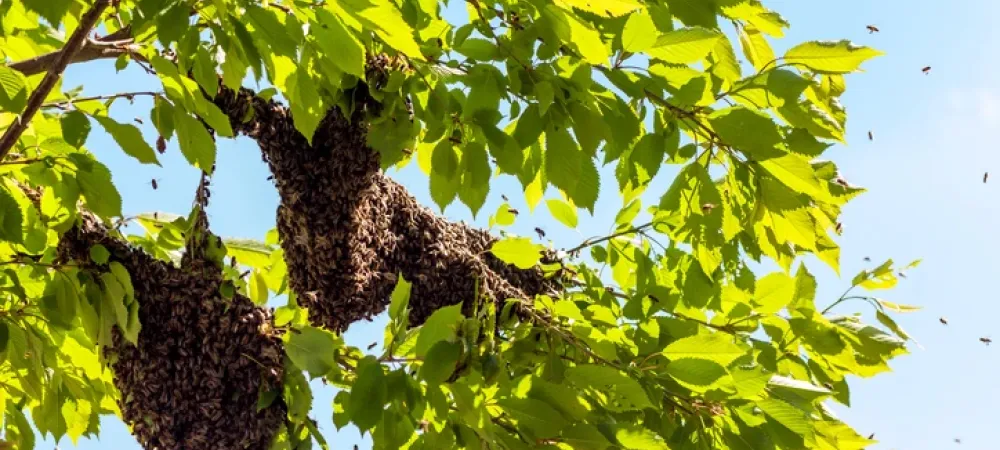Honeybee Swarming Season is Here!

Starting in the early spring we are accustomed to honeybee swarming activity. A healthy hive will send out scouts to locate a new home while a new queen bee is preparing to set up housekeeping. When the time is right, several thousand worker bees will accompany a queen to her new home. Sometimes they stop for a rest or an overnight stay on a tree branch on their way; if they are left alone, they usually move on as soon as the sun comes out. An exposed bee swarm can very often be rescued by a competent beekeeper during the spring and in the early summer when the new bee colonies are at their largest and healthiest. Please call Pinpoint for an evaluation, right over the phone, if you have a bee swarm on your property.
Don’t use a garden hose on bee swarms! Whether it is rain, sprinklers, or a garden hose, the natural instinct of bees is to stay in place and shed the water to protect the queen. The hose can break up and spread out the swarm, but they cannot leave without the queen and they do not travel when it is raining. Using sprinklers or a garden hose to move bees is counterproductive and will usually end up causing the bees to stay much longer and will increase the danger of stings to residents, pets, or to those who are passing by.
The bees have made a remarkable comeback from the “Colony Collapse Disorder” scare four years ago. The empty hives were caused by instincts that the African bees brought into the country with them. Tropical bees do not prepare for winter and when they are stuck in a cold box, they just move on! Bee keepers in areas that freeze in winter are adjusting by re-queening their hives each summer. All of the studies have shown that pesticides are not related to colony collapse.
Africanized bees are a hybrid strain that comes primarily from crossing African drones (males) with European honeybee queens. Each hybrid hive has its own personality, and some are extremely aggressive while others are relatively docile. Our biggest problem with wild swarms and hives is the parasites and the diseases that they carry but they can also be very aggressive and have been known to attack in great numbers. Usually the aggression does not start until a brood comb is in place and the bees have a family to protect. Tropical bees pollenate very well and they travel well; they are hardy bees that reproduce rapidly and are somewhat resistant to the parasites that they have introduced. Many professional pollenating companies prefer hybrids over the milder European breeds. Honey is used by European bees as insulation against the cold and as a food supply during the winter. Tropical bees and hybrids are not driven to produce honey because they do not expect cold weather. Check out the attached picture of the hive materials that I pulled out of a valve box in San Marcos. There is almost NO honey, and the comb is full of brood! Tropical and hybrid queens often lay more than two thousand eggs a day! That is a lot of little stingers!
Look down! European bees do not like to locate their hives where they might be threatened by snow or ice but African and hybrid bee colonies are very comfortable close to the ground; you want to be especially careful when you see bees coming and going from under a shed, in a valve box, or a water meter, because they could be very dangerous. Well-established hives are more likely to be aggressive than new swarms because they have a hive and brood to protect. They have been known to attack in great numbers and they can be deadly to pets and to people who cannot outrun them! Don’t jump in the pool! Bees can fly longer than you can hold your breath.
Honeybee swarms are pineapple-sized clumps of bees that surround a queen bee while they are searching for a new home. Bee swarms that stop on a tree branch to rest for a few hours should be left alone as long as they are not a danger or a liability. They usually leave on their own. If the swarm is large enough it can be recovered by a local beekeeper. Just give us a call for a referral to a person who loves bees and will save the hive for honey production … this should NOT be expensive!
If you have a honeybee swarm or a hive on your property here in North County, please give me a call and I will advise you over the phone.